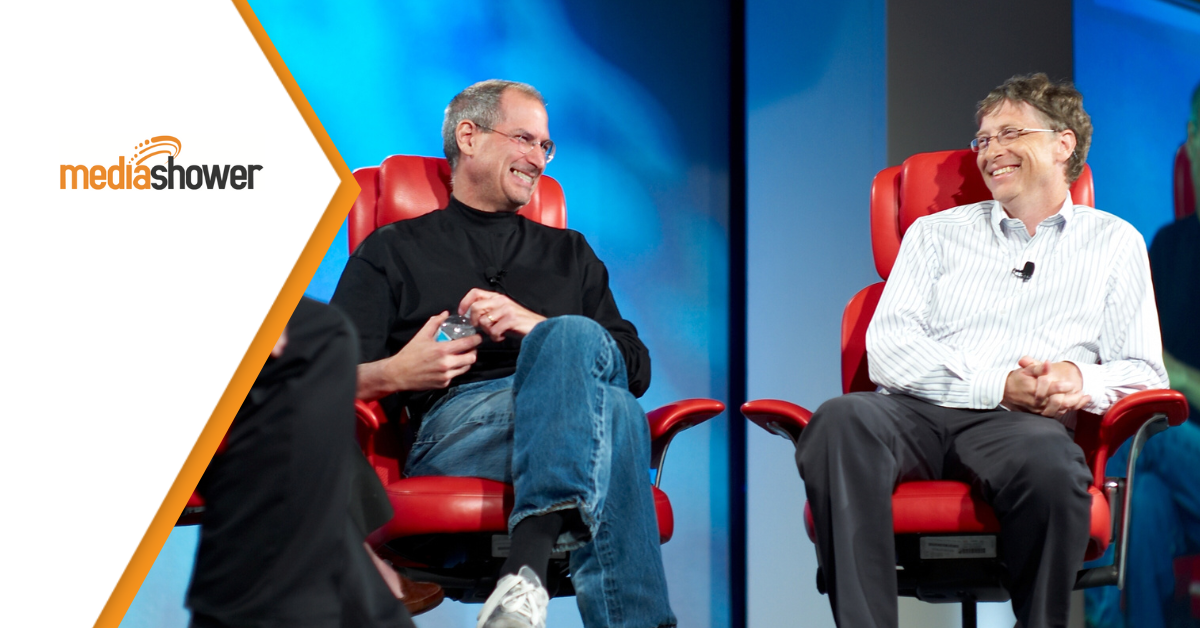
TLDR: Bill Gates and Steve Jobs both founded industry-changing computer companies. Jobs’ singularly-focused communication style produced a different company than Gates’ broader, more pragmatic communication style.
So What? The story of the two biggest computer titans of the PC era show how underlying differences in personal philosophy can change the world. The difference lies in preferences for multiplicity vs. unity.
Right now, there are about 1.4 billion computers running Microsoft Windows. That’s more than the population of China.
Since 2007, about 2.2 billion iPhones have been sold. That’s more than the population of China and the United States combined.
There is a large chance you’re viewing this article using either Microsoft or Apple technology.
The companies founded by Bill Gates and Steve Jobs have had outsized impacts on communication worldwide. The communication preferences of these men still impact how people exchange information.
Gates and Jobs had different communication strategies. Steve Jobs was famously singular and streamlined in his vision, while Bill Gates is a bit more diffuse.
These differences have made Microsoft and Apple the companies they are today. The key distinction lies in multiplicity vs. unity: multi-purpose Microsoft software for every computer vs. a single, streamlined ecosystem exclusively built for Apple products.
As Microcosms of Microsoft and Apple
A company’s communication practices tend to mimic the preferences of its most dominant founder.
There is a strong case to be made for this with Jobs and Apple. Before his death in 2011, Jobs was known to be authoritarian and dictatorial.
Many of Jobs’ specific preferences influenced whole products. For example, his fear of buttons led to the touchscreen interface of the iPad.
Jobs was a committed Zen Buddhist, and he would meditate in monasteries for weeks at a time. He adopted a minimalist, monk-like lifestyle with few possessions. It’s hardly surprising that Apple has since become known for its clean, minimalist design and aesthetic.
Microsoft has historically proceeded with less lofty ideals. Its products are less sleek than Apple’s, but they offer more compatibility with different hardware.
The communication styles of Microsoft and Apple (and a fortiori Gates and Jobs) can be summed up like this:
- Microsoft’s ideals are fundamentally incremental, adaptable, and functional (multi-purpose).
- Apple’s ideals are fundamentally revolutionary, exclusive, and beautiful (singular purpose).
Incremental Vs. Revolutionary
Steve Jobs’ most famous act of communication was his yearly keynote speech. These were the speeches in which he introduced the latest Apple products. The iPod, iPhone, iPad, and countless other products were announced during these events.
Jobs’ minimalist communication style shows through in his speeches; his presentations don’t even use bullet points. These events made Apple known for producing revolutionary, market-making products. While Microsoft has had similar events, they have not had the same lasting impacts.
Microsoft’s yearly product launches have bullet points in their presentations. Similarly, they launched many new products with more incremental significance that were built slowly over a previous year’s design. You might say their multi-purpose goals diluted the revolutionary significance.
Microsoft’s launch events also feature many speakers besides Gates reflecting their broader, shared visions of communication. Here, we see the whole team dancing alongside him at the launch of Windows 95.
Adaptable Vs. Exclusive
Microsoft software works on many different computers, while Apple software only works on Apple computers.
This difference allowed Microsoft to dominate the personal computer market for decades, as competing hardware manufacturers drove prices down — but they all ran Windows.
It also reflects the different communication styles of multiplicity vs. unity. Windows works on many computers, with many applications. MacOS works on one type of computer with a smaller set of applications.
Both approaches can work. Multiplicity comes at the price of security vulnerabilities and compatibility issues. Unity means more consistent designs and the cost of not communicating with everything.
These different, yet basic approaches to communication reflect the different philosophies of Gates and Jobs. Gates wanted to sell software to anyone who would buy it; Jobs wanted to change the world.
Functional Vs. Beautiful
Apple products are designed to be beautiful; Microsoft products are designed to complete tasks.
Both companies produce useful and functional products, but there is clearly a different design emphasis. To Apple, it’s actually a feature, not a bug, that their products aren’t fully compatible with Android or Windows applications. This helps keep customers fixed within their ecosystem.
To Microsoft, looks are important, but they started out selling products primarily to users in business and academic settings. Getting stuff done was the main priority.
These differences in both appearance and design reflect the difference in who Jobs and Gates saw as their customer. Jobs wanted to appeal to the everyday consumer; he wanted computers to become truly personal, whereas Gates was pragmatic and focused on appealing to the existing market.
Insights from Gates and Jobs
Bill Gates and Steve Jobs both built computer empires that changed the world. Their underlying philosophies affected the methods through which they and their companies communicated.
Their differences suggest some important insights about communication:
- Communication can be broad or narrow, reflecting multiplicity or unity. You can opt to target as many people as possible or to focus on smaller demographics.
- There is a relationship between communication width and noise. There is little doubt that Jobs and Apple are much more streamlined in communication when it comes to both presentations and products, but their focus is narrower than Microsoft’s.
- Subtle differences in global views can make huge differences in the real world. Jobs’ minimalist, Zen-like outlook led directly to Apple’s simple product designs. Gates lack of a singular worldview allowed for a broader range of multi-purpose designs.
At Media Shower, we study world-class communicators like Jobs and Gates to help our technology clients market their message better. To learn more about our approach, click here to try out our award-winning content platform.
